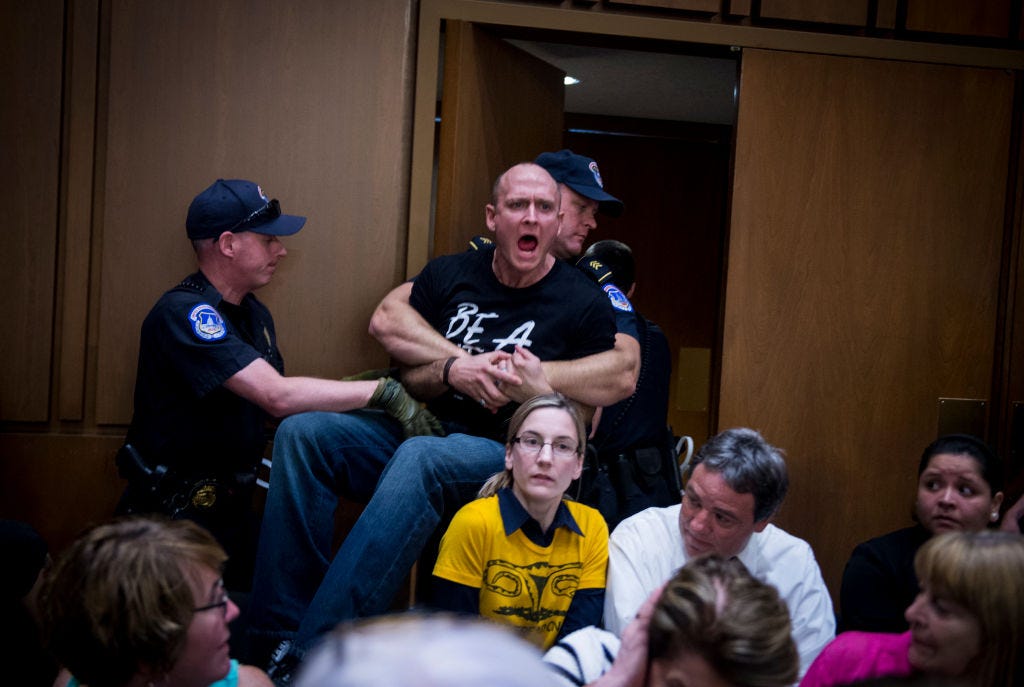How One Trump January 6 Charge Could End Up Criminalizing Left-Wing Protest
The unusual application of an Enron-era accounting law could open up a prosecutorial Pandora's Box of criminalizing a wide range of protest.
A protester is removed by Capitol police during the hearing of Supreme Court nominee Brett Kavanaugh in front of the Senate Judiciary Committee in the Hart Senate Office Building on Thursday, Sept. 6, 2018. Photo By Sarah Silbiger/CQ Roll Call.
Could the push for accountability over the U.S. Capitol riot on Jan. 6, 2021, end up sending left-wing activists to prison for decades?
In addition to straightforward charges of assaulting police officers and violent entry, federal prosecutors are trying to lock up former President Donald Trump and other Jan. 6 defendants for violating an obscure criminal statute –penal code 18 U.S.C. 1512(c)(2) – never used before in a similar context.
The charge under this statutory provision makes it a crime to “corruptly” obstruct, influence, or impede any official government proceeding, and carries a maximum sentence of up to 20 years in prison.
The provision, part of the Sarbanes-Oxley law passed after the Enron scandal, was originally intended to create harsh penalties for accountants destroying evidence during a government investigation. The application of the Sarbanes-Oxley provision for interrupting congressional proceedings by protest is completely unprecedented. The provision has only been used in relation to document-related cases.
On Tuesday, Justice Department special counsel Jack Smith indicted former President Donald Trump with several new charges related to the Jan. 6 riot, one of which was the 1512(c)(2) crime of “obstructing a government proceeding.”
The special counsel indictment details a criminal effort by Trump to delay and overturn the 2020 election results. The former president faces a number of criminal allegations, such as plotting to defraud the United States government and conspiracy to deprive the American people of their right to have their votes counted properly.
But there has been little discussion of the legal ramifications of the third charge, which alleges that by delaying the counting of the Electoral College in Congress, Trump criminally obstructed an official government proceeding. It is the same provision of the criminal code faced by over 300 Jan. 6 riot participants.
While the indictments have been cheered by progressives seeking justice for the violent riot and push to overturn the last presidential election result, the novel application of the felony charge may open the prosecutorial equivalent of a Pandora's box.
Disruption of government proceedings is an activist tactic that is widely revered among left-wing movements.
Consider the following examples:
Extinction Rebellion, a group that uses confrontational tactics to demand action on climate change, superglued themselves to doorways in Congress, blocking lawmakers and staff from attending evening votes.
Left-wing demonstrators attempted to stop the confirmation of Supreme Court Justice Brett Kavanaugh through a variety of delaying tactics. Activist groups openly planned actions designed to disrupt the committee hearings with protests, by "standing up, vocalizing our dissent, being arrested and forcibly removed.”
In 2016, Democrats staged a sit-in on the floor of the House of Representatives to demand a vote on gun control legislation. The sit-in ground the legislative chamber to a halt for an entire day.
These protests were prosecuted lightly. The vast majority of the more than 200 people arrested during the Kavanaugh protests were charged with a misdemeanor of disorderly conduct, crowding, or obstructing, which carries no prison time and a fine of $35 or $50.
Prosecutors of the Jan. 6th cases, notably charge that the intent of the riot was to overturn the result of the 2020 election. Again, similar arguments could be made against Democrats, who mobilized an attempt to persuade “faithless” electors in the Electoral College to disregard their states’ votes for Trump in 2016 and flip the election to Hillary Clinton. Law professor Larry Lessig, attorneys, and activists pushed this plan, which failed to persuade a significant number of electors to change their vote.
In 2004, Democrats and several activist groups challenged the veracity of the Ohio election result, charging that irregularities and conflicts of interest surrounding the voting machines in that state had improperly swung the state for George Bush.
But were these actions altogether different from the kind of “obstruction of an official proceeding” charges leveled against Jan. 6 participants and now Trump?
Several Jan. 6 defendants, including Joseph Fischer, Edward Lang, and Garret Miller, have won federal court cases throwing out the 1512(c)(2) charge. D.C District Court Judge Carl J. Nichols has ruled that the government was improperly using a statute designed for document-related investigations, not riots or protests.
But the Department of Justice appealed the Nichols ruling to the D.C. Circuit Court, where a three-judge panel took up the case.



